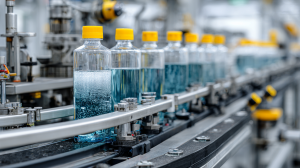
In the fast-paced world of manufacturing, efficiency and precision are paramount. As industries strive to meet increasing consumer demands, the role of technology becomes ever more critical. Among the various innovations that have revolutionized manufacturing processes, filling machines stand out as a cornerstone of modern production lines. These machines are designed to handle the meticulous task of filling containers with liquids, powders, or granules, ensuring consistency and accuracy. From food and beverages to pharmaceuticals and cosmetics, filling machines are indispensable in a wide array of industries. This article delves into the benefits of using industrial filling machines in large-scale manufacturing, highlighting their impact on productivity, quality, and cost-effectiveness.
Benefits of Using Industrial Filling Machines
Industrial filling machines offer numerous advantages that significantly enhance the manufacturing process. One of the primary benefits is the increase in production efficiency. These machines are capable of filling hundreds or even thousands of containers per hour, far surpassing the capabilities of manual labor. This high-speed operation not only boosts output but also reduces the time required to complete large orders, allowing manufacturers to meet tight deadlines and increase their market competitiveness.
Another critical advantage is the improvement in accuracy and consistency. Filling machines are equipped with advanced technology that ensures each container is filled to the exact specified volume. This precision minimizes product waste and ensures that consumers receive a consistent product every time. For industries such as pharmaceuticals, where dosage accuracy is crucial, this feature is particularly vital.
Moreover, filling machines contribute to cost savings in several ways. By automating the filling process, manufacturers can reduce labor costs and minimize human error, which can lead to costly product recalls or rework. Additionally, the efficiency and speed of these machines can lead to lower energy consumption per unit produced, further reducing operational costs.
Applications in Various Industries
Filling machines are versatile and can be adapted to suit the needs of different industries. In the food and beverage industry, these machines are used to fill bottles, cans, and jars with products ranging from soft drinks and juices to sauces and condiments. The ability to handle different container sizes and shapes makes them ideal for this sector, where product variety is vast.
In the pharmaceutical industry, filling machines are essential for ensuring the safe and accurate packaging of medicines. These machines are designed to meet stringent hygiene and safety standards, preventing contamination and ensuring that each dose is correctly measured. This is crucial for maintaining the efficacy and safety of pharmaceutical products.
The cosmetics industry also benefits from the use of filling machines. Products such as lotions, creams, and perfumes require precise filling to maintain quality and customer satisfaction. Filling machines can handle a wide range of viscosities and container types, making them suitable for the diverse needs of cosmetic manufacturers.
Innovations and Future Trends
The field of filling machines is continuously evolving, with new technologies and innovations enhancing their capabilities. One notable trend is the development of smart filling machines that incorporate IoT (Internet of Things) technology. These machines can communicate with other equipment on the production line, allowing for real-time monitoring and adjustments to optimize performance and reduce downtime.
Another exciting development is the integration of robotic systems with filling machines. This combination allows for greater flexibility and automation, enabling manufacturers to quickly adapt to changes in product demand or packaging requirements. Robotic systems can also improve the precision and speed of the filling process, further enhancing efficiency.
As sustainability becomes a growing concern, filling machines are also being designed with environmental considerations in mind. Manufacturers are focusing on reducing waste and energy consumption, as well as using eco-friendly materials in machine construction. These efforts not only benefit the environment but also align with consumer preferences for sustainable products.
For more information on complete filling lines, including bottling lines, visit https://stm-pack.com/filling-lines-categories/complete-filling-lines/bottling-lines/.



